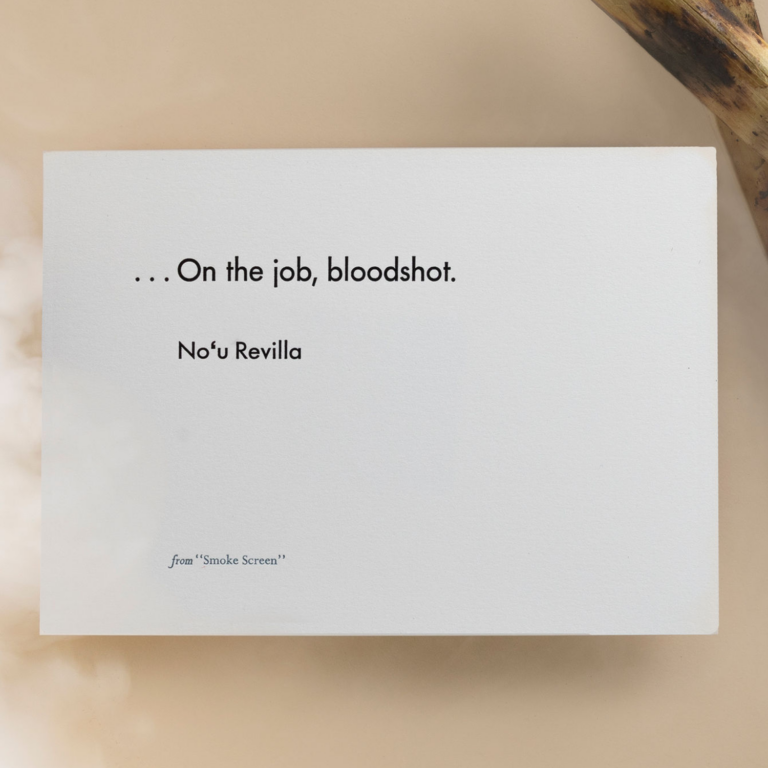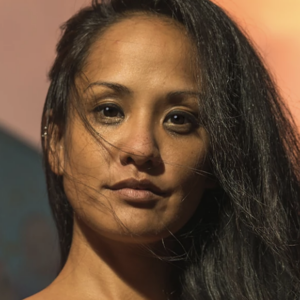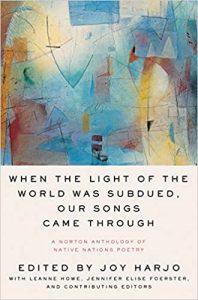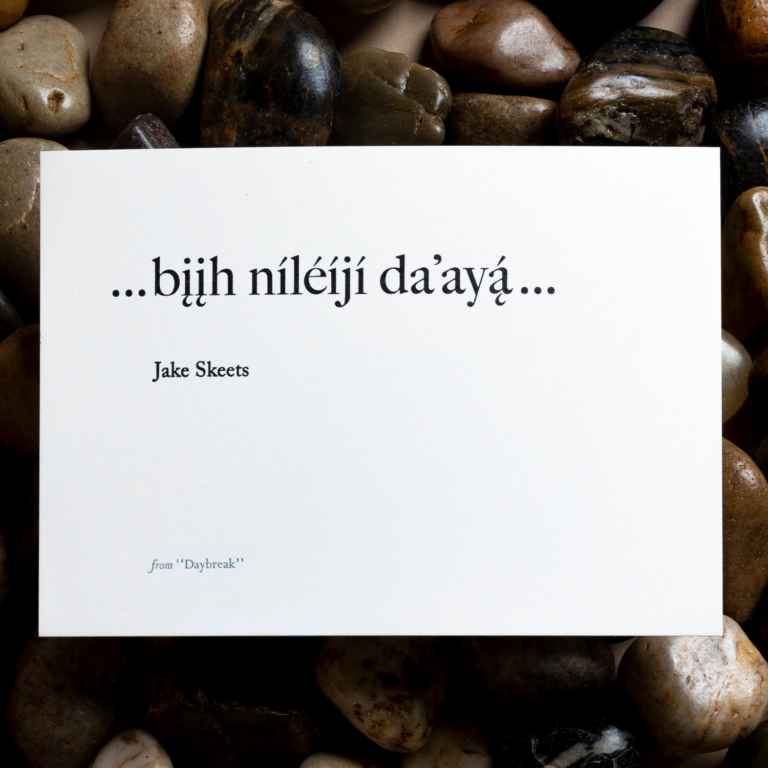No‘u Revilla
Smoke Screen
The life of a sugar worker is the center of this poem: a worker whose body and person bear the imprint of that industry, with its demands and smoke and exhaustion. The worker in question is the poet’s father, and No’u Revilla brings us into a consideration of how he takes pride in work that depleted him, how he needed to find ways to recover from work that exhausted him, how in his body he carries the story of Hawai’i and its indigenous people.

Letterpress prints by Myrna Keliher | Photography by Lucero Torres
Guest

No‘u Revilla (she/her) is an ʻŌiwi (Native Hawaiian) queer poet and educator. Born and raised with the Līlīlehua rain of Waiʻehu on the island of Maui, she currently lives and loves with the Līlīlehua rain of Pālolo in the ahupuaʻa of Waikīkī on Oʻahu. She has performed and facilitated workshops throughout the pae ʻāina of Hawaiʻi as well as in Papua New Guinea, Canada, and the United Nations. She is an assistant professor of creative writing at the University of Hawaiʻi-Mānoa and is proud to have taught poetry at Puʻuhuluhulu University in the summer 2019 as she stood with her lāhui to protect Maunakea. A winner of the 2021 National Poetry Series, her debut poetry book will be published by Milkweed Editions in 2022.
Transcript
Pádraig Ó Tuama: My name is Pádraig Ó Tuama, and one of the things I love about writing poetry, as well as reading it, is that sometimes I might write a first draft of a poem about something or someone that’s annoyed me, but as I edit the poem, usually the things about them that annoyed me have to go to a new level, and I have to look at the poem, and through the poem, look at them in a new way — not to justify the unjustifiable, but perhaps to ask questions about the circumstances, about the place, about the time. And that asks me to ask questions of myself, as well as to hold up accountabilities to them and accountabilities to me.
[music: “Praise the Rain” by Gautam Srikishan]
“Smoke Screen” by No‘u Revilla:
This poem comes with a dedication: “for every hard-working father who ever worked at HC&S, especially mine.” HC&S stands for Hawaiian Commercial and Sugar Company.
“Was he a green, long sleeve jacket
and god-fearing man?
On the job, bloodshot.
Marrying metal in his heavy
gloves, bringing justice to his father,
who was also a smoking man.
No bathroom breaks, no helmets, no safe words.
He whistled sugarcane through his neck,
through his unventilated wife,
his chronic black ash daughters.
This is what a burn schedule looks like.
And if believing in god was a respiratory issue,
he was like his father.
Marrying metal to make a family.
At home he smoked before he slept,
in the corner with the door
ajar, cigarette poised like a firstborn:
well-behaved, rehearsed.
Curtains drawn, bedrooms medicated.
He was always burning into something.
Part-dark, part pupils.
For my father, the night was best alone.
When only he could see through
the world and forgive it.”
[music: “Orchard Lime” by Blue Dot Sessions]
I love how this poem is such an intense look at somebody who is also looking intensely. It’s a look at one person, the poet’s father, and through him the poem explores a family and a society and an industry, and centuries of history, too. There’s so much echoes of Hawai‘i’s history, from colonization to the overthrow of the kingdom of Hawai‘i into it being a territory of the States before it became a state. There’s so much of all of that is gathered into the question of burning, in the context of this poem.
And we learn a lot about this man, No‘u Revilla’s father, but we don’t know too much about her, except for the fact that she has an extraordinary capacity to observe. So she is present in her observation in this poem, but not so present. There’s a presence and absence of her in this poem, too, which I think is very beautiful.
[music: “Flor Vjell” by Blue Dot Sessions]
So this man is a worker at the Hawai‘i Commercial and Sugar company, and his father was, too. And it’s spoken of that his relationship with work is like a relationship to family. You know, on the job he’s “marrying metal in his heavy gloves.” So there’s a way within which a person’s industrial job, working for the sugarcane factory, is somehow linked to the way that they bring that job home, the way that that job affects the whole family, and not just because of the circumstances of the father, but also because of the conditions of the air.
Sugarcane is burnt in order to make it easier to harvest. And that affected the air and the water and the growing conditions in Hawai‘i. And so once again, in this poem, we’re seeing the father in the way that he’s closely attached to the question of his work, and his pride even in a workplace that does not treat him well, but he still has his pride in working hard, and that affects his family.
This poem doesn’t sketch a lot of shared moments between No‘u Revilla and the father character in the poem. But there are somehow levels of profound respect and pride, maybe even love, in watching his solitary actions — perhaps the ways that he has to remove himself from so much of his life in order to be able to recover, to hold himself together.
And in the context of that is paying of close attention to her father’s work and his father’s work and their pride, even of an industry that could be brutal on your lungs and the lungs of your family. This poem honors those tender moments where he took a bit of time for himself — maybe where he needed a bit of time for himself.
No‘u Revilla has made a poem where she links the work of her father, the work that consumes him even outside of work, and the health conditions of the families who live nearby workplaces like this, she’s written a poem that links so many people around the world who are in those circumstances, together. This is a workers’ poem, and a family of workers’ poem.
[music: “The House You Wake In” by Gautam Srikishan]
So HC&S stands for Hawaiian Commercial and Sugar Company, and that is a really important presence in this poem. You can consider the history of Hawai‘i through the lens of the sugar industry. Sugarcane grows plentifully there, and in 1866, the Kingdom of Hawai‘i was the center of sugar production. Sugarcane is local to there, but the industry had been taken over for decades already at that stage, and I mean that negatively, because trade, and then the interaction between trade and missionary organizations and families from European or white American families, so much there had been taken over. Those groups had brought in thousands of workers from China and the Philippines and Japan and Madeira as indentured laborers to the sugar industry. So there was an extraordinarily stratified state, when it came to work and inheritance, and voting rights, too.
The Kingdom of Hawai‘i, obviously, as you can hear in the word “kingdom,” had its own monarchy, but throughout the 1800s the monarchy had been manipulated and sometimes forced at gunpoint into signing various kinds of orders and even a constitution that gradually reduced the monarchy of Hawai‘i’s power. And as a result of doing that, it reduced the capacity for Hawaiians’ recognition of their belonging on the land to be acknowledged in the way that it had traditionally been, as well, too, as their voting rights, as it was moving towards being annexed, to become a territory of the United States in the late 1800s.
And so you can see ways within which land ownership and language, and, of course, too, religion, through the missionaries, and voting rights — these usual technologies of colonization were being worked out there in ways that had absolute detriment on Indigenous people and was being used to the profit of people who were not sharing profits in a proper way.
[music: “What Did You Not Hear” by Gautam Srikishan]
No‘u Revilla is a poet of Native Hawaiian descent. And she was born and raised on the island of Maui, and now she teaches at the University of Hawai‘i, at the campus on Oahu. And as an adult, she learned Ōlelo Hawai‘i, the Hawaiian language, in her 20s. And part of the process of recovering that language — that language should never have been lost in that place. It was taken away, really, due to the project of colonization.
And for her, speaking that language is a reminder of the bones of place. And there’s been such a sense of connection about what it means to be a speaker of a language in a family, and what it means to voice a language, and the recognition that you can learn Hawaiian language easily enough if you go to look for this in Hawai‘i, but somehow there is a recognition that things have moved now, where people might see that as, why would you bother learning it? Will it help you get a job? And somehow the project of removing a language, like colonization does, it causes continual removements throughout the successive generations.
And even that question of, will it help me get a job? — that’s the wrong question to ask about a language, especially an Indigenous language. The question is, will it help me live? Will it help me know where I am? Will it help me feel connected to myself, to land, to spirituality, to place? And I so admire her work, writing in English, including words from Native Hawaiian tongue, and finding ways to promote and share the possibility of, as much as is possible, recovering something that is necessary, in the usage of that language.
[music: “Ashed to Air” by Gautam Srikishan]
Smoke appears over and over again in this poem, and, by association, burning and fire. So, early in the poem you hear, “his father, who was also a smoking man.” And then, later on you hear, “he whistled sugarcane through his neck, through his unventilated wife, his chronic black ash daughters.” And then you hear, “This is what a burn schedule looks like,” and further on, “and if believing in god was a respiratory issue”; then, “he smoked before he slept,” and “he was always burning into something,” and also the title, “Smoke Screen.”
And you can think about this, perhaps, as an individual man smoking a cigarette. And then maybe you can think of it as an individual man smoking a cigarette, like his father had smoked a cigarette. But it’s a much bigger presence in the poem and in the context within which the poem is being written.
HC&S had had a practice of burning fields of sugarcane before the harvest, in order to remove the dry leaves; thousands of hectares of burning, every week, for months of the year. And this obviously caused all kinds of respiratory issues in residents, especially children. And the smoke also contributed, later on, up until the 20th century — HC&S only closed in 2016 — it contributed to car crashes. And then water and wood and land and deforestation have also been irreversibly changed through this enormous sugarcane industry.
And so smoke in the poem isn’t just about cigarettes. In a certain sense, cigarettes are the smokescreen for the really important point of the poem, which is to reflect on the presence of smoke, on the presence of burning, on the presence of fire and destroying. What is being burnt? What is being put to fire? What is being destroyed through the context of this industry in Hawai‘i? And No‘u Revilla is highlighting, I think, that so much of care, so much of sovereignty, so much of what the shape of family could be like and what it could be like to be together — those are the things that have been set alight. The smoke screen is the man needing his own silence and quiet and isolation at night, smoking a cigarette.
[music: “White Filament” by Blue Dot Sessions]
I think this poem knows that it’s important to look further than just the one thing. This poem could’ve been a poem of criticism about this father character in it, but it’s not. It looks through him. It looks beyond the smokescreen of what might be happening in his life and looks at an entire industry. And in that way, I think the poem has a profound wisdom for us who might be in situations of family where you’d go, “It wasn’t perfect. It wasn’t ideal.” In no way is this poem naïve, but this poem is asking systemic questions about, what are the circumstances of a person’s life?
And this poem resists cynicism. Somehow, without pretending, this poem inserts love and pride and dignity and connection into a poem that could have been something very different from that. And that, I think, is a really interesting call of wisdom for all of us who might find it easy to be annoyed by what’s right in front of us, to take another look and another look, to see the system that’s being revealed by the annoying thing in front of us.
The word “forgiveness” is right at the end of that poem, and I wonder, who’s being forgiven? Is this forgiveness in a family? Is it wishing for forgiveness for people who did terrible things in the context of colonization? Is it holding that out? Is it saying that it couldn’t be given? Somehow, by using that word, “forgive” — “when only he could see the world and forgive it” — by using that word there, I think there is a hope for being able to look clearly, look through a smokescreen at the circumstances that there were, and find a way to clear that smokescreen and say, Let’s tell the truth and, as a result, move into something that might look like forgiveness.
[music: “Orchard Lime” by Blue Dot Sessions]
“Smoke Screen” by No‘u Revilla:
It’s dedicated, “for every hard-working father who ever worked at HC&S, especially mine.”
“Was he a green, long sleeve jacket
and god-fearing man?
On the job, bloodshot.
Marrying metal in his heavy
gloves, bringing justice to his father,
who was also a smoking man.
No bathroom breaks, no helmets, no safe words.
He whistled sugarcane through his neck,
through his unventilated wife,
his chronic black ash daughters.
This is what a burn schedule looks like.
And if believing in god was a respiratory issue,
he was like his father.
Marrying metal to make a family.
At home he smoked before he slept,
in the corner with the door
ajar, cigarette poised like a firstborn:
well-behaved, rehearsed.
Curtains drawn, bedrooms medicated.
He was always burning into something.
Part-dark, part pupils.
For my father, the night was best alone.
When only he could see through
the world and forgive it.”
[music: “Praise the Rain” by Gautam Srikishan]
Chris Heagle: Thank you to No‘u Revilla, who gave us permission to use her poem “Smoke Screen,” from the book When the Light of the World Was Subdued, Our Songs Came Through, edited by Joy Harjo.
[music: “Praise the Rain” by Gautam Srikishan]
Poetry Unbound is: Gautam Srikishan, Erin Colasacco, Eddie Gonzalez, Lilian Vo, and me, Chris Heagle.
Our music is composed and provided by Gautam Srikishan and Blue Dot Sessions.
This podcast is produced by On Being Studios, which is located on Dakota land. We also produce other podcasts you might enjoy, like On Being with Krista Tippett, Becoming Wise, and This Movie Changed Me. Find those wherever you like to listen, or visit us at onbeing.org to find out more.
Books & Music
Recommended Reading
The On Being Project is an affiliate partner of Bookshop.org and Amazon.com. Any earnings we receive through these affiliate partnerships go into directly supporting The On Being Project.







